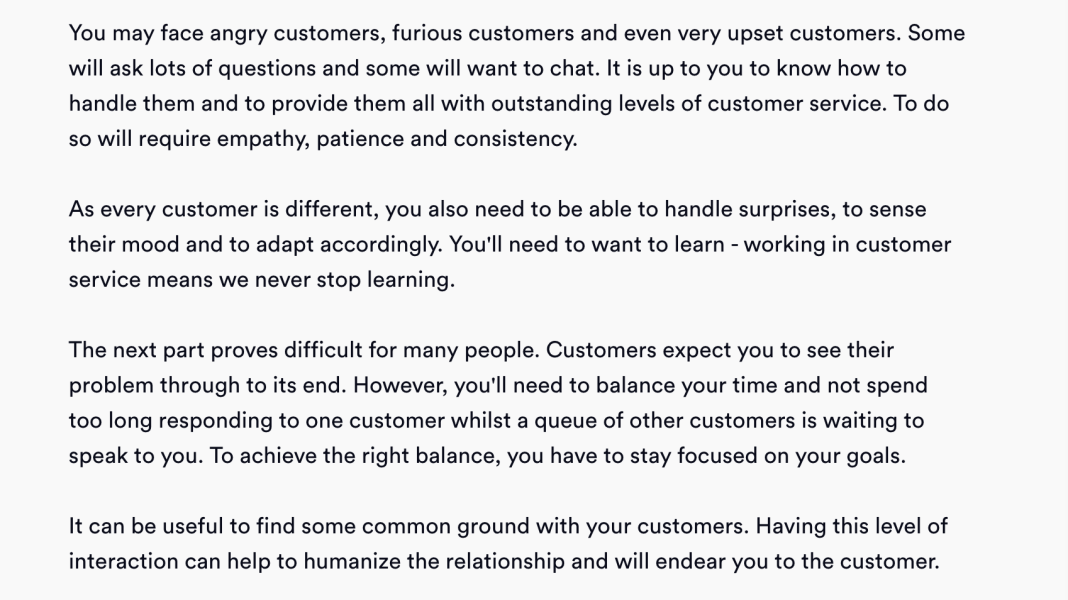What is a verbal reasoning test?
A verbal reasoning test assesses your ability to make deductions from text. The format is typically a written passage followed by a statement, and you must decide whether the statement is true, false or that you cannot say. They evaluate your understanding of language and level of verbal comprehension and logic.
Depending on the role you are applying for, questions may range from basic reading comprehension to more advanced reasoning. There are also a number of different test providers used by recruiters, offering a range of verbal reasoning assessments for different industries and job levels. We will look at these in more detail later in this article.
Why do employers use verbal reasoning tests?
Verbal reasoning tests are psychometric tests designed to reveal a candidate’s language and comprehension skills, and their ability to apply reasoning and logic.
These are key in any working environment, which is why verbal reasoning tests are so popular with employers in a wide range of industries – even those you might not think require strong verbal skills.
Many employers also regard verbal reasoning tests as more fair than other types of assessment, such as an unstructured interview. This is because all candidates face questions of a similar level of difficulty and their tests are scored objectively.
So verbal reasoning tests may help to provide a more level playing field for applicants from all backgrounds. However, a verbal reasoning test is likely only to form one part of a wider selection process, and your performance in all areas will be taken into consideration by the employer.
How do verbal reasoning tests work?
There are two main formats of verbal reasoning tests:
Verbal critical reasoning – these test your ability to apply logic by confirming whether a given statement is verified by the text provided.
Reading comprehension – these assess your ability to digest written information and then use the information provided to answer questions quickly and accurately.
The most common form is the true/false/cannot say test, where you are required to read some text and then determine whether the statement that follows is true, false or impossible to say based on the information provided.
Other forms of verbal reasoning tests you may encounter are:
Explicit multiple choice – here the answer to questions will be explicitly stated in the text. For example ‘Who said..?’ or ‘How many..?’
Implicit multiple choice – here the answer will not be explicitly stated but can be inferred from details provided in the text. For example ‘What made the employee decide to…?’; or ‘What caused…?’
Meta multiple choice – here the answer does not refer to details specifically given in the text but requires the candidate to answer broader questions such as ‘What can we conclude from…?’ or ‘Which statement would weaken the argument..?’
Regardless of the format of the test, you will need to read the text, interpret the information and decide on the most logical conclusion. It is important to remember that no previous knowledge of the passage topic is required, so make your decisions based solely on the information you’re given.
As well as or instead of verbal reasoning tests, you may also be asked to take a verbal test assessing your language and literacy skills. This could include:
Grammar and spelling – checking your knowledge of correct spelling and grammar. These might include questions such as find the new word and word swap (for more on those, check out the videos at the bottom of this article).
Vocabulary – testing the range of your vocabulary and your ability to identify correctly how ideas are related. This is usually in the form of synonyms or antonyms (words that have the same or opposite meaning to another).
Word analogy - testing your ability to find the relationship between a pair of words. Examples of word analogy questions can be found here.
How best to prepare for a verbal reasoning test
The best way to perform well in a verbal reasoning test is to make sure you are familiar with the format and have done plenty of practice before you sit the test. Practice questions will help you to identify your weaknesses and develop your own methods for success.
If you’d like to practice online, you can start with our verbal reasoning test questions and answers. Or download our verbal reasoning test pdf if you’d prefer to work offline.
During your practice, make a note of your most common mistakes or the aspects you struggle most with, and then focus on improving your performance in these areas. And be sure to take the practice tests under timed conditions – speed as well as accuracy will be crucial when it comes to the real thing.
Try to find out which test provider the recruiter will be using (see next section), and the type of test you will be sitting. You should then be able to visit the provider’s website to find more information and possibly try a few example questions.
Also check out our article on how to prepare for a verbal reasoning test for more advice on getting ready for your assessment, as well as our verbal reasoning tips and tricks article.
Common verbal test providers
Below are some of the most widely used verbal reasoning test providers. These are the ones you are most likely to come across, though check with the employer first if you can.
Some will have their own bespoke tests, tailored to situations the candidate will encounter in the role.
SHL Verify Ability Test
SHL is probably the most popular test publisher. SHL verbal reasoning tests typically have a time limit of 17 to 19 minutes and cover various difficulty levels, often including reports and documents. You can try some practice questions here.
Criterion Utopia Verbal Reasoning Test
The questions in this high-level verbal reasoning test – aimed at managers and graduates – get more difficult as the test progresses. You will have 30 minutes to answer 40 questions.
Talent Q Elements Verbal Ability
These tests are adaptive, which means the difficulty level is automatically adjusted according to your performance in the previous questions. There is typically a time limit of 90 seconds per question. You can try out a practice test here.
Cubiks Logiks Verbal Ability Test
The Logiks tests have two levels: intermediate and advanced. In the intermediate test, you have to answer 24 questions in 4 minutes (only 10 seconds per question; but the difficulty is low). In the advanced test, you have 25 minutes to answer 36 questions. You can try some sample questions here.
Kenexa/PSL Advance Verbal Reasoning Test
There are two levels to this test: general ability, which has an 18-minute time limit for 24 questions, and graduate/managerial, which has a 25-minute time limit for 32 questions. More on Kenexa tests here.
Pearson TalentLens Verbal Reasoning Test
Pearson TalentLens’ verbal reasoning tests focus on evaluating a candidate’s ability to understand, analyze, and interpret written information, often used to assess critical thinking skills.
Saville Assessment Verbal Reasoning Test
Saville Assessment’s verbal tests measure one’s ability to comprehend, interpret, and utilize verbal information, tailored for various professional roles, emphasizing the application of verbal reasoning in work-related scenarios.














